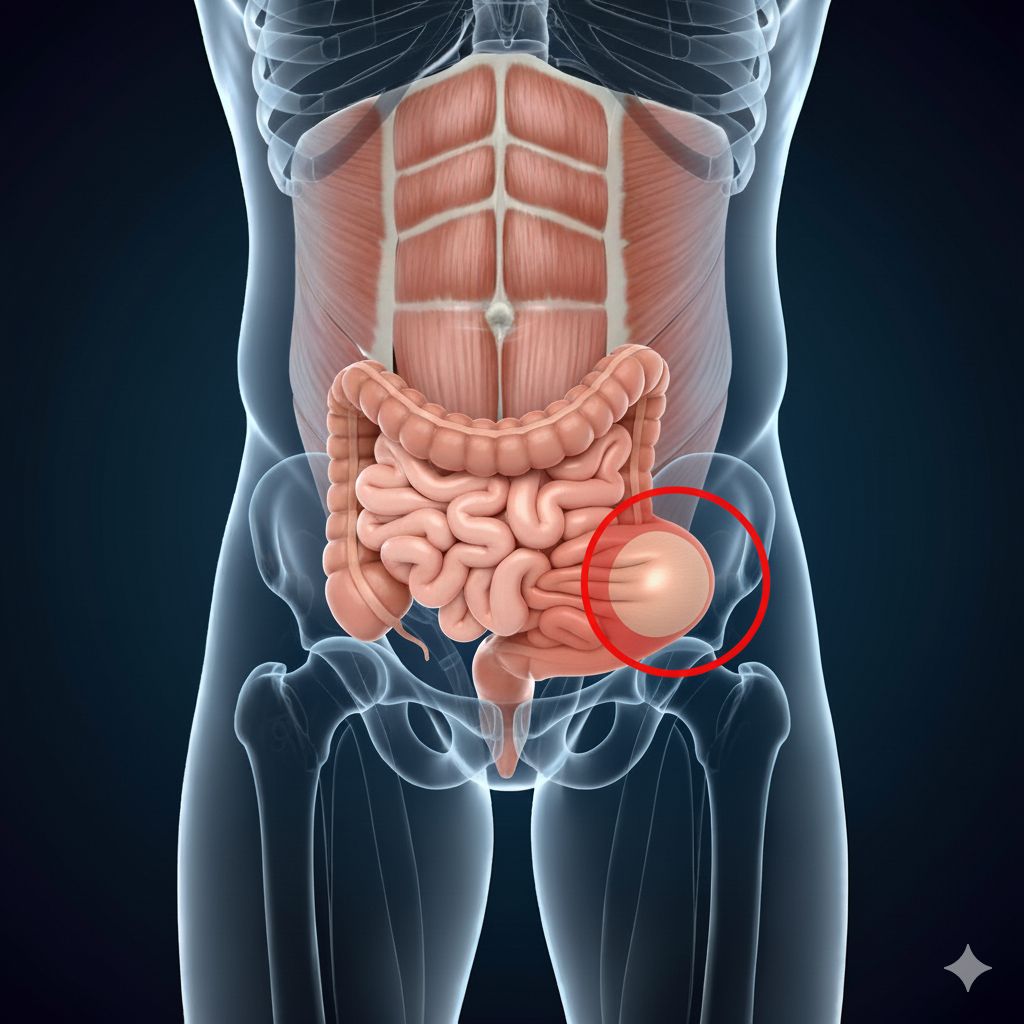Inguinal and Stomach Hernias: Symptoms, Causes, and Treatment Options
What Is a Hernia?
A hernia is a medical condition that occurs when an internal organ or tissue pushes through a weak spot in the muscle or surrounding tissue wall, often in the abdominal area. This protrusion typically happens through a weakened section of the abdominal lining, forming a bulging sac. The sac may contain parts of the intestine or other abdominal structures. Hernias do not heal on their own and may lead to serious complications such as pain, intestinal obstruction, or strangulation if left untreated.
Definition and History of Hernia
Hernias were first described in the medical literature in 1804 by English surgeon Sir Astley Cooper. Today, hernias remain one of the most common conditions requiring surgical intervention.
Most Common Types of Hernias
- Inguinal hernia
- Femoral hernia
- Umbilical hernia
- Incisional hernia
Other types of hernias, such as those affecting the cervical and lumbar spine and related to nerve compression, also exist. However, this article focuses on hernias associated with the digestive system.
What is an Inguinal Hernia?
An inguinal hernia forms when internal abdominal organs push through the inguinal canal. This usually occurs at weak spots in the abdominal wall that may be congenital or acquired over time. Due to anatomical differences, inguinal hernias are more common in men than in women.
Symptoms of Inguinal Hernia
- A visible bulge in the groin area that increases over time
- Pain that intensifies when standing, lifting, or coughing
- Redness and tenderness around the hernia site
- Nausea, vomiting, and digestive issues
- A feeling of fullness or pressure that worsens with movement
Factors That Contribute to Hernia Formation
- Heavy lifting
- Chronic constipation and straining
- Difficulty urinating
- Abdominal fluid buildup (ascites)
- Obesity
- Prolonged coughing (asthma, COPD)
- Genetic predisposition and advanced age
Conditions That Can Be Confused with a Hernia
- Groin abscesses
- Enlarged lymph nodes (lymphadenopathy)
- Hydrocele (fluid accumulation in the testicles)
- Testicular torsion
- Lipomas (fatty tumors)
- Boils (folliculitis or abscess)
What Is a Hiatal Hernia?
A hiatal hernia occurs when the upper part of the stomach slides up into the chest cavity through an opening in the diaphragm. The diaphragm is a muscle layer that separates the abdominal and chest cavities. When the stomach pushes upward through a weakened spot in this muscle, a hiatal hernia develops.
Symptoms of Hiatal Hernia
Small hiatal hernias typically cause no symptoms. However, larger hernias or those accompanied by acid reflux may present with the following signs:
- Heartburn and acid reflux
- Vomiting
- Belching, hiccups
- Bitter or sour taste in the mouth
- Chest pressure or pain
- Bloating and indigestion
- Difficulty swallowing, unexplained coughing
Paraesophageal Hernias
This rare type of hernia occurs when the stomach pushes up alongside the esophagus. It may be asymptomatic, but can also present with symptoms such as post-meal bloating, gagging, difficulty breathing, or chest discomfort.
How Is a Hiatal Hernia Diagnosed?
The main diagnostic methods include:
- Barium Swallow Test: Imaging of the digestive tract using a contrast agent
- Endoscopy (EGD): Direct visual examination of the stomach and esophagus with a camera
- Chest X-ray: General view of the structures around the diaphragm
How Is a Hiatal Hernia Treated?
Non-Surgical Lifestyle Changes:
- Eating small, frequent meals
- Avoiding food at least 2–3 hours before bedtime
- Sleeping with the upper body elevated
- Avoiding tight clothing
- Following a fiber-rich diet to prevent constipation
- Quit smoking
- Avoid heavy lifting
When Is Surgery Necessary?
Inguinal hernias usually require surgical intervention for a permanent solution. Laparoscopic surgeries offer a minimally invasive approach with less pain and quicker recovery. In the case of hiatal hernias, surgery may be considered if reflux symptoms significantly affect quality of life or if complications arise due to the hernia.


